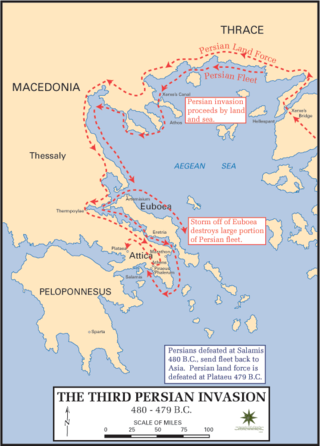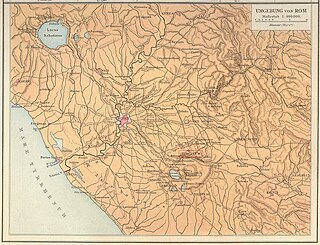
The 5th century BC started the first day of 500 BC and ended the last day of 401 BC.
Year 481 BC was a year of the pre-Julian Roman calendar. At the time, it was known as the Year of the Consulship of Vibulanus and Fusus. The denomination 481 BC for this year has been used since the early medieval period, when the Anno Domini calendar era became the prevalent method in Europe for naming years.

Year 479 BC was a year of the pre-Julian Roman calendar. At the time, it was known as the Year of the Consulship of Vibulanus and Rutilus. The denomination 479 BC for this year has been used since the early medieval period, when the Anno Domini calendar era became the prevalent method in Europe for naming years.
This article concerns the period 499 BC – 490 BC.
This article concerns the period 489 BC – 480 BC.
This article concerns the period 459 BC – 450 BC.

Year 480 BC was a year of the pre-Julian Roman calendar. At the time, it was known as the Year of the Consulship of Vibulanus and Cincinnatus. The denomination 480 BC for this year has been used since the early medieval period, when the Anno Domini calendar era became the prevalent method in Europe for naming years.
Year 485 BC was a year of the pre-Julian Roman calendar. At the time, it was known as the Year of the Consulship of Cornelius and Vibulanus. The denomination 485 BC for this year has been used since the early medieval period, when the Anno Domini calendar era became the prevalent method in Europe for naming years.

Tusculum is a ruined Roman city in the Alban Hills, in the Latium region of Italy. Tusculum was most famous in Roman times for the many great and luxurious patrician country villas sited close to the city, yet a comfortable distance from Rome.
Quintus Fabius Vibulanus, son of Marcus Fabius Vibulanus, was consul of the Roman Republic and one of the second set of decemviri.

The Battle of Mount Algidus was fought in 458 BC, between the Roman Republic and the Aequi, near Mount Algidus in Latium. The Roman dictator Lucius Quinctius Cincinnatus turned an expected Roman defeat into an important victory.
Octavius Mamilius was princeps of Tusculum, an ancient city of Latium. He was the son-in-law of Lucius Tarquinius Superbus, the seventh and last king of Rome. According to tradition, the gens Mamilia was descended from Mamilia, reputedly a granddaughter of Ulysses (Odysseus) and Circe. Titus Livius described Octavius as head of one of the most distinguished families of Latium, and thus an important ally of Tarquinius.
Caeso Fabius Vibulanus was consul of the Roman republic in 484, 481, and 479 BC. He had earlier held the office of quaestor parricidii in 485 BC in connection with the trial and execution of Spurius Cassius Vecellinus.
Lucius Furius Medullinus, of the patrician gens Furia, was a politician and general of the Roman Republic who was consul twice and Consular Tribune seven times.
Titus Quinctius Capitolinus Barbatus was a Roman statesman and general who served as consul six times. Titus Quinctius was a member of the gens Quinctia, one of the oldest patrician families in Rome.
The Roman-Aequian wars were a series of wars during the early expansion of ancient Rome in central Italy against their eastern neighbours, the Aequi.
Quintus Fabius Vibulanus was an aristocrat of the Early Roman republic. He was the first of three brothers to hold the consulate, in both 485 and 482 BC.
Lucius Sergius Fidenas was a Roman politician during the 5th century BC, and was elected consul in 437 and 429 BC. In 433, 424, and 418 BC he was military tribune with consular power.
Lucius Lucretius Tricipitinus was a Roman senator in the fifth century BC, and was consul with Titus Veturius Geminus Cicurinus in 462 BC.
Marcus Fabius Vibulanus was consul of the Roman republic in 442 BC and consular tribune in 433 BC.



